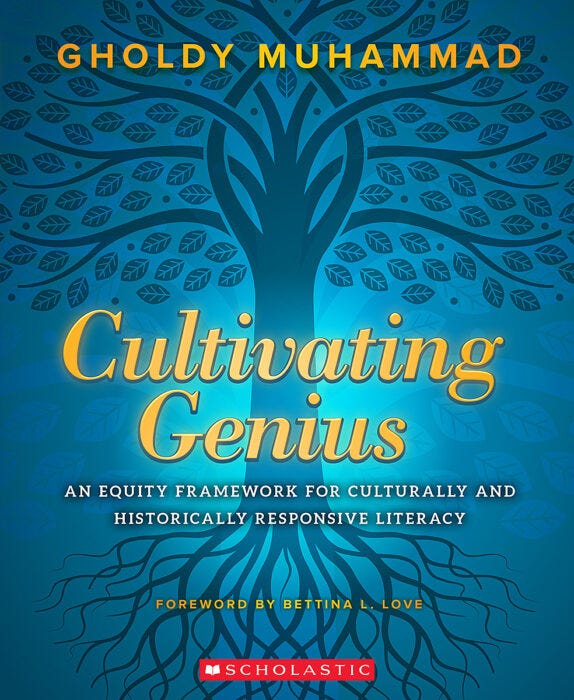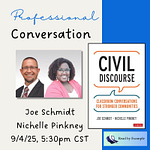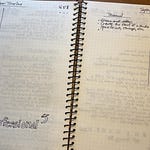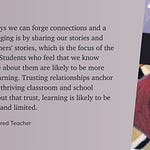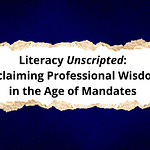We follow up on our previous conversation for Cultivating Genius: An Equity Framework for Culturally and Historically Responsive Literacy by Dr. Gholdy Muhammad, I am joined by contributors Gen Arcovio, Ryanne Deschane, Rhonda Precourt, and Carrie Thomas.
We used the following three questions to guide our conversation:
What takeaways did you gain from this book?
What questions do you still have?
How have you changed after reading this book?
This wraps up the book study. Thank you for your readership and leadership!
Relevant Resources
Full Transcript
Matt Renwick:
So, I want to welcome everyone to the second of two book discussions around Cultivating Genius by Gholdy Muhammad, and I have several guests with us today. We're just going to go around the room and introduce yourselves, and we'll start with Ryanne.
Ryanne Deschane:
My name is Ryanne Deschane, and I am a first grade teacher in northern Wisconsin.
Rhonda Precourt:
I can go next. I am Rhonda Precourt, and I am a reading recovery teacher/K-2 literacy interventionist, although this past school year, I did teach kindergarten, and I teach in upstate New York. I also blog with Gen at literacypages.wordpress.com, and we also have a Facebook group. You can search Literacy Pages. And we also have a Twitter. You can follow us on Twitter @literacypages, too.
Gen Arcovio:
I think it makes sense for me to go next. I'm Gen Arcovio, and I am also a literacy specialist interventionist and trained reading recovery teacher in upstate New York. I work in the same district as Rhonda, and I am the co-creator of the Literacy Pages blog.
Carrie Thomas:
Hi, and I'm Carrie Thomas. I am a reading specialist/literacy coach in a small, private school outside of Philadelphia, Pennsylvania.
Matt Renwick:
Well, I am excited to be with Ryanne, Gen, Carrie, and Rhonda here. They've already posted their posts at this point, and they've been well-received by readers. In response to the book, Cultivating Genius... seemed like just such a timely text. I realize it came out last year, but it's been very helpful for me as I think about preparing for the 2021-2022 school year. So, I thought we'd just go around the room and just everyone share one response to each of the three questions around the book. The first one is what are one, two, or three key ideas that you took away from Cultivating Genius? And we'll start with Ryanne.
Ryanne Deschane:
Okay. So for me, it's a very complex text, but think my biggest takeaway is the histories of marginalized people are important for us to understand our present educational system as well as a path forward. If we don't understand the history, then we don't understand maybe where some of those systemic inequities have came from and what we need to do to move forward in a new direction. So, that was my big takeaway.
Matt Renwick:
I would concur with that.
Gen Arcovio:
I'll go next, because what I was going to say connects to what Ryanne was talking about. I think you can't read this book without taking away the fact that White educators need to do more research themselves. And I think it's been a few years in the making for me, culminating now with reading this book, to really understand how inequitable my own education was, except I was the one that benefited from it and didn't even realize that it was at the expense of other people. And it kind of brings up some anger to be at this point in my life and only just be realizing how inequitable it was in so many ways.
Gen Arcovio:
And then, when I read Cultivating Genius, to realize how much history there is in Black culture regarding literacy and learning that I am only just now knowing. So, it's my responsibility now to kind of redefine my own identity as an educator and do more research in that regard.
Matt Renwick:
I appreciate the honest perspective, Gen. Carrie or Rhonda, do you want to share kind of key ideas here?
Carrie Thomas:
I'll go next. One of the things I took away and I thought was really fascinating... So, Gen, you brought up the literary... and how Black folks have a history of these literary societies. And actually, Philadelphia has a ton... has such a rich history of Black literary societies. And me being right outside of Philadelphia, and I teach students who come to my school from Philadelphia schools and in the city, and so it just kind of is like this natural way to connect the students with literacy history and be like, "No, actually, there is a rich history."
Carrie Thomas:
And I think it's like you said. I'm a White educator, and I teach mostly Black and Brown students. And so, to have this history of these literary societies that now I know about, and it is my responsibility to be like, "Oh, here is this fantastic history, and here are things we've learned from these literary societies that we can take into schools now and really lift up and celebrate what all of our students have to bring to the table."
Matt Renwick:
Yeah. You're well positioned, Carrie, within this context of the book, as well as where you're located.
Rhonda Precourt:
Something I really took away was just this whole idea of teaching kids how to have a positive identity about themselves, because that's not just for people of a different color. There're so many different things within identity that serve a minority like women, like homosexuals, students who are learning English for the first time. All of these groups really could serve to have this focus on knowing who they are as people and understanding their culture and background. It leads to more acceptance of yourself and others being accepting of you and feeling like you belong and have a place in the classroom and in your world. So, I found myself reading that part about identity over and over again, because it just really, really made me think.
Matt Renwick:
Yeah. For myself, I appreciate the distinction that the author made between culturally-relevant and culturally-responsive literacy instruction. I don't think anyone that I've read yet has differentiated between the two. I mean, culturally-relevant seemed more like more on the curriculum side of things, and culturally-responsive more on the instruction side of things. But like you said, Rhonda, I need to reread it to make sure I'm understanding it correctly. But yeah, a lot of rich ideas that you've all illuminated.
Matt Renwick:
And you talk about identity. Thinking about one or two changes that you might want to make or you've already made since you've read this, I'll just kind of throw out for the whole group. I can certainly go first. I think I've always... I teach in a predominantly White area, and I've always thought I need to make sure that I'm representing in our texts and our instruction a lot of diverse representations, I guess, but it really hit home for me that even if this is what our population is, how critical it is for those one or two or three kids that do come in our schools. I mean, I wouldn't say it's more important, but it's just really important for those kids to see themselves when they live in an area like I live in. Other thoughts on that, and just changes you've made or you're planning to make?
Carrie Thomas:
So, I'll speak. I actually just submitted my post about this today, but I thought of two... And it's funny, because I actually picked up this book right when it came out. I saw it, and I was like, "Oh my gosh, I'm going to get this. It's going to be great for my students. It's going to be great for my school. And so, I have... On the cover, it says "An Equity Framework," and I have literally used this book for the framework to design the literacy program at my school. Before I got there, there was no real comprehensive, cohesive literacy program, so I was kind of tasked with building one from the ground up. And so, I had to do a lot of digging into, what had already been there? What materials are we using? What does the curriculum look like? How are we assessing our students?
Carrie Thomas:
And what I found out, especially from after reading this book, I realized that a lot of the materials we were using, a lot of the ways we were assessing the students and finding levels and doing all that stuff you have to take data on and everything was not very culturally-responsive at all. Matt, you talked about being in a predominantly White area, and I kind of ran into the problem where I teach mostly predominantly Black and Brown students, but the texts that we were using still featured mostly White people on the cover, or animals, right? Because animals have a higher percentage of being on covers than Black and Brown students.
Carrie Thomas:
So, I kind of had a similar problem that I had to start finding texts and finding materials where the students could see themselves at all represented, because they just weren't seeing themselves in anything. Weren't reading stories about themselves, weren't getting assessments that they could recognize names or situations or anything like that.
Carrie Thomas:
And so, one of the biggest takeaways was the identity and just reinforced how important it is where students can see themselves in the text and really make that connection. Once I started showing students books with characters that looked like them, and they were like, "Oh, my gosh, this character looks like me, and I know what it's like to go to the barbershop and get my locks taken care of." Or, "I know what it's like to see an LGBTQ character doing this, because I can relate to that." It just kind of reinforced the importance of that seeing themselves in the text.
Matt Renwick:
Mm-hmm (affirmative). Gen or Rhonda, what are your thoughts on this in terms of changes you might make or you already have?
Gen Arcovio:
I think there are some quick changes that I can make. A higher focus, even though I'm an interventionist, and so I'm primarily working with individuals or small groups of students, I can still do more work with identity. I can still use this framework to look at my lessons every day and see if I am accounting for all of these areas that she's talking about. Building identity, building intellectualism, all of those pieces that she's talking about. This book is really a call to action for us all to critique what we're doing, and I can do that right now with what I'm in control of where I work.
Gen Arcovio:
I think asking daily, "Does what I'm doing right now today with this student or these students really develop their intellectual wisdom, or is it telling them what to be or do?" And so, that's something quick I can do now, but then there comes the systemic part. How do we disrupt the system to favor all students? That's the bigger change that has to take place that requires a bigger group of people. So, that will be on our plates to make sure that what we've learned here goes someplace else besides my room and the students I work with.
Matt Renwick:
Yeah. I like that call to action, and I think that's a great, great way to see this book. Rhonda, did you want to add to that?
Rhonda Precourt:
Yeah. There was a part in the book about how students are often described kind of in a negative way, Black students, especially, in urban areas. And so, I think too, as a literacy specialist, you meet with teachers a lot, so it gives us the opportunity to model that positive talk. Leading with the student's strengths rather than starting with the things that they need. So, that's one way I think that I could make a change. Well, it's something that I'm doing, but to be a little bit more intentional about it, maybe.
Rhonda Precourt:
Another thing I was thinking about is to maybe just question things more. This book made me think about so many situations that I've come across as a teacher, and one situation that just popped in my head today was I had a parent contact me before school started, and they wanted to know if there were going to be any other Black children in the classroom, because her daughter was Black. And I feel like at the time, I just... I was kind of like, "Well, okay," but I don't think I really thought about it the way I should have. Now I'm thinking, what was that parent's experience like in school? Most likely, she grew up in that same area in the same classrooms with lots of White people.
Rhonda Precourt:
Even just think about my own kids, if I had to advocate for them to be in a setting where they would be with other kids like them so they would feel like they belong. If education looked different, and we already had things in place, it wouldn't matter, I feel like, if you were in a classroom with people that... wasn't very diverse, if it was set up in a way that they could still see themselves in different ways, if that makes any sense.
Matt Renwick:
For sure. One of the posts, I can't remember whose it was, but it started to question just a typical practice that they've had in their school. It might have been Gen. Was it you, Gen?
Gen Arcovio:
Yeah, the "what you want to be when you grow up"?
Matt Renwick:
Yeah.
Gen Arcovio:
Yeah.
Matt Renwick:
You almost seemed like you were looking at that event through new eyes, and I thought that was a nice example of what Rhonda's talking about. And I think kind of leads into our last part, which is just, what's one question you have still after reading this book? And for me, it's... I don't know why I get stuck on these things, but I wanted to see the unit template. She talked about units and lessons. I'm such a concrete thinker in some ways, but I wanted to see, what was the unit template looking like? Her lessons were great in the back, but just from a book standpoint, what was that progression of learning? What was that kind of story that you can create around historically-responsible literacy instruction beyond just the one lesson? But it was just that a question I had. What about you? Ryanne, what do you think?
Ryanne Deschane:
I'm going to be the elephant-in-the-room person. Mine is for administrators or principals and other colleagues who haven't yet begun to grapple or delve into this work who maybe come from a stance of, "You're going at this too fast, and it's very politically charged." How to shift that mindset to beginning the work and engaging and investing in learning more. I think that's a difficult challenge, especially where I'm at, because we don't have a lot of diversity, so sometimes, the narrative is, "Why does it matter?" I guess years ago, I probably was on that same wavelength, because it's like Maya says, do what you know until you know better, and then do better. And so, I'm trying really hard to do better, but I don't quite know how to get others there. And so, that's my big question of, how do we do that?
Matt Renwick:
Mm-hmm (affirmative). That culture is huge.
Rhonda Precourt:
Ryanne, Ryanne, I think I was thinking along the same lines as you. I think that we do have a pretty big push in our area to attack this type of work, but I don't... How do we get to the place where we're not just kind of going through the motions of learning about these things or even doing a book study, but it doesn't really meet the need that... or meet the purpose that we really want to meet?
Ryanne Deschane:
Yeah. I want that call to action to be now. I want everybody to be on that same wavelength of, "Hey, we need to jump in with both feet." There is no, "People aren't ready for this." Come on. Let's just do it.
Gen Arcovio:
And it's uncomfortable. It's uncomfortable. And when you see something that doesn't look like it will be equitable, or it looks like it may support oppression in some way, it's uncomfortable to say something, but we have to say it. I think that's my... my goal for myself is to always say something, but you're right, because not everyone is in the place to hear it. And so, I had that down as a question, too. How do we get this in front of people who need to see it? Like you're saying, the ideas, we need to go fully, we need to build this up, we need to make everyone comfortable, but there have been millions of people who have not been comfortable for a very long time. So, that's also my question, too. And then also, where do I look next? What resource do I go to next to help with that?
Carrie Thomas:
So, yeah, I feel like I have a similar question, right? Like, how do we get other people on board with this? Because it's one thing for us all to be sitting here having a book club and talking about the book and like, "Oh, we're going to read this," but what do we do? And so, that's something I've been thinking a lot about this year. At my school, I'm one of the founding members of our diversity committee, and so we are very committed to action steps as part of the group, because it's like we just need to do something, and as small as it is, it just has to be something.
Carrie Thomas:
So, we take small actions, like, "What can we do?" I frequently send out booklets and highlight some celebrations that are coming up. You know, "It's Ramadan, so here's a book list for Ramadan that's coming up." Right? "It's Eid, so here is what we do on Eid." Just these action steps and getting it into just everyday language. This is what we're about now. This is what the school is about. This is what instruction is about. And really, when the question comes up, because it always comes up, like, "Why do we have to do this? We've been doing this for 30 years. I don't know why we need to change things." And it's because it always comes back to the students. It's like, "Well, look at the students. What is the best thing for our students? What do our students need?" Because that's what we're doing in school, right?
Carrie Thomas:
And so, I think that's kind of where I tie everything, and sometimes it's difficult for people to get on board with that, but I think really just being strong, and this is for our students, and this is the world our students are growing up in, and this is what they need to know, and this is how to prepare them to be out there. So, I think my question is kind of like, how do we get other people on board, and what size is the action step? Where is that line between too little and then too much, and how do we navigate that area of action there?
Matt Renwick:
I think the fact that we're recording this, and we're going to post this publicly, our thoughts, I think is a great first step. I think when we talk about this as a group, we normalize it, just like we would do in a school, and it just gives permission for everyone else to start talking about it, too. And little things that you're doing in your schools to make it part of your culture and to be the leaders that you are. I don't think of any of you as just teachers. I think of you all as leaders, too, and your willingness to put your thoughts down publicly, I think, is courageous. So, I want to thank you all for doing that and thank you for being here tonight.
Carrie Thomas:
Thank you.
Gen Arcovio:
Thank you.


